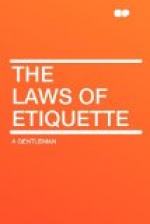It is a mark of high breeding not to speak to a lady in the street, until you perceive that she has noticed you by an inclination of the head.
Some ladies courtesy in the street, a movement not gracefully consistent with locomotion. They should always bow.
If an individual of the lowest rank, or without any rank at all, takes off his hat to you, you should do the same in return. A bow, says La Fontaine, is a note drawn at sight. If you acknowledge it, you must pay the full amount. The two best-bred men in England, Charles the Second and George the Fourth, never failed to take off their hats to the meanest of their subjects.
Avoid condescending bows to your friends and equals. If you meet a rich parvenu, whose consequence you wish to reprove, you may salute him in a very patronizing manner: or else, in acknowledging his bow, look somewhat surprised and say, “Mister—eh—eh?”
If you have remarkably fine teeth, you may smile affectionately upon the bowee, without speaking.
In passing ladies of rank, whom you meet in society, bow, but do not speak.
If you have anything to say to any one in the street, especially a lady, however intimate you may be, do not stop the person, but turn round and walk in company; you can take leave at the end of the street.
If there is any one of your acquaintance, with whom you have a difference, do not avoid looking at him, unless from the nature of things the quarrel is necessarily for life. It is almost always better to bow with cold civility, though without speaking.
As a general rule never cut any one in the street. Even political and steamboat acquaintances should be noticed by the slightest movement in the world. If they presume to converse with you, or stop you to introduce their companion, it is then time to use your eye-glass, and say, “I never knew you.”
If you address a lady in the open air, you remain uncovered until she has desired you twice to put on your hat. In general, if you are in any place where etiquette requires you to remain uncovered or standing, and a lady, or one much your superior, requests you to be covered or to sit, you may how off the command. If it is repeated, you should comply. You thereby pay the person a marked, but delicate, compliment, by allowing their will to be superior to the general obligations of etiquette.
When two Americans, who “have not been introduced,” meet in some public place, as in a theatre, a stagecoach, or a steamboat, they will sit for an hour staring in one another’s faces, but without a word of conversation. This form of unpoliteness has been adopted from the English, and it is as little worthy of imitation as the form of their government. Good sense and convenience are the foundations of good breeding; and it is assuredly vastly more reasonable and more agreeable to enjoy a passing gratification,




